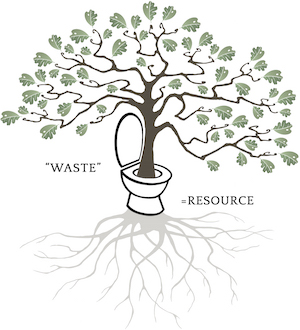Compost Toilet Research Project Update: Pleasing Government & Grandma!
Since we embarked on this journey to introduce Ecological Sanitation principals into the mainstream, our mantra has been to “satisfy both government and grandma.” In other words, composting toilet systems must be completely safe and manageable from public health and land use perspectives, AND they must also provide a pleasant enough user experience so that not even your grandma would be grossed or weirded out by them. 😉 Watch the video here >
The Compost Toilet Research Project, as part of our “Conservation Hydrology” demonstration site, has been a key part of our redevelopment campaign in the building of new guest accommodations and meeting facilities. With these extremely low-water toilets (0 to 6 oz per use), OAEC is saving more water even as we expand our capacity to host and convene groups for more days of the year. We see composting toilets as a critical “nexus solution” to directly address climate resiliency at the intersection of water, soil and energy. Read more about Ecological Sanitation >
After completing our 2-year permitting process with Permit Sonoma, Sonoma County Public Health Department and the North Coast Regional Water Quality Control Board last year, we’ve been primarily focused on installation and troubleshooting throughout 2018. All three of our compost toilet trial systems are now up and running* and we will be ready to start taking test samples of finished compost from two of the systems by the end of this year. Our maintenance and housekeeping crews have learned a lot throughout the installation process and have given key input on the research and policy aspect of the project led by OAEC’s Soil Scientist, Miriam Volat. As we work out the initial kinks and settle into an effective maintenance routine, we move closer to a clean seal of approval from both government and grandma with every use!
Our Garden View guesthouse system was the first to be installed. It gets turned each week where the waste is combined with wood-shavings and air for composting. We initiated this system with both compost tea inoculations and red-wigglers and we are thrilled that it now has an active worm population! The Fern Rock guesthouse system has taught us a lot about working with a vacuum pump to move waste from the toilet to the composting unit, an option when topography does not allow for gravity movement. The first round of finished compost from these systems will be ready for test sampling any day now!
*The last toilets to be installed in our new Meeting Hall are still undergoing some retrofitting. Because of their higher frequency of use and proximity to the meeting room itself, we realized quickly that the “foam flush” toilets were not appropriate for that location for a variety of reasons, including too much maintenance, noise and ventilation issues. Grandma was not going to be happy! Conventional venting systems didn’t work for these so we had to fine tune our permit to fit within building code. In order to address these concerns, we are moving to the vacuum flush toilets (think airplane bathroom) that have been so successful in our Garden View guesthouse system.
We continue to keep our regulatory partners fully abreast and involved with changes and will be including the details in our forthcoming report and recommendations that will result at the end of the 2-year study. Our local agencies are excited to receive this level of nitty gritty detail and to partner with us in figuring out whether/how these systems could become a viable option for medium scale commercial use and a solution to water saving mandates from the state. Once the study is completed, the next step will be for Miriam and our government representatives to undergo the process of writing model code language for onsite water treatment systems manuals that may translate to other counties or other parts of government. OAEC plans to continue participating in the California Onsite Water Association (COWA) black-water working group and contribute to COWA’s efforts to unify best practices for stewarding our waters across disciplines and sectors. Ultimately, we would love to convene a meeting here at OAEC to fine tune strategies for moving forward on statewide level and beyond.
But hey, let’s not put the honey bucket before the horse! In the meantime, we are in the humanure and data collection phase of the project. We invite you to be a part of science: come use our toilets at a permaculture course, school garden teacher training, tour or garden volunteer day! And bring your Grandma!
Please note: We are still 3+ years away from being able to provide education or resources to the public and simply do not have the staff capacity at this time to answer general inquiries about this project over the phone or email. We will do our best to keep friends, followers, and donors abreast of our some of our findings along the way, so please subscribe to the OAEC newsletter and like us on Facebook for more updates.
Donate to the Compost Toilet Research Project >






